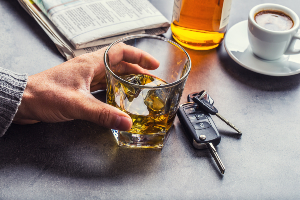 Having dinner with your family or going out to celebrate a friend’s birthday are fun ways to enjoy your time. During these events, you’ll often be exposed to alcohol. While drinking responsibly is expected of all individuals, there are times when you may feel sober, but your blood alcohol content (BAC) is over 0.08%. This means that if you drive with your BAC higher than 0.08%, you can face a DWI conviction.
Having dinner with your family or going out to celebrate a friend’s birthday are fun ways to enjoy your time. During these events, you’ll often be exposed to alcohol. While drinking responsibly is expected of all individuals, there are times when you may feel sober, but your blood alcohol content (BAC) is over 0.08%. This means that if you drive with your BAC higher than 0.08%, you can face a DWI conviction.
In Texas, drunk driving is taken very seriously and comes with harsh penalties. While you may be familiar with driving under the influence (DUI), you may be unfamiliar with driving while intoxicated (DWI). Both terms refer to drinking and driving, but their differences separate the two in Texas law. Continue reading for more information about what makes these two so different.
DUI vs. DWI: What You Need to Know
The main difference that distinguishes the two from one another is that a DUI in Texas is designated for individuals who are considered minors. Individuals who are not minors, who are caught drinking and driving can face DWI charges. Understanding the difference between the two and how the consequences vary is vital for your case.
Driving Under the Influence (DUI)
According to Texas Penal Code Section 106.041, a DUI in Texas refers to minors who are operating a motor vehicle in a public place, or a watercraft, “with any detectable amount of alcohol in the minor’s system.” Some of the main punishments an individual may face with a DUI conviction in Texas include:
- First offense: For an individual’s first offense, their citation is for a class C misdemeanor and can fine them a maximum of $500.
- Second or Third offenses: If this isn’t their first offense or they have a higher BAC concentration, these individuals may face harsher penalties, and the charge can turn into a DWI.
If the minor has any form of alcohol or drugs in their system at the time of the arrest, they can face severe punishments that will significantly affect them in the future if they are convicted.
Driving While Intoxicated (DWI)
For individuals who are not minors, if they are caught driving with a blood alcohol content (BAC) over 0.08%, they can face severe consequences. Not only are they at risk of harming their reputation and career, but they can face jail time and a suspended license depending on the number of prior offenses and concentration of alcohol in their system.
- First offense: Maximum of a $2,000 fine, from 72hours up to 180 days in jail upon conviction, loss of license up to a 180 days.
- Second offense: Maximum of a $4,000 fine, one month to a year in jail upon conviction, loss of license up to two years.
- Third or more offense or intoxication assault: Maximum of a $10,000 fine, two to 10 years in prison, and loss of license up to two years.
- Intoxication manslaughter: As a second-degree felony, intoxicated manslaughter carries a fine of up to $10,000 and a two to 20 years prison sentence.
A DWI conviction in Texas is a serious offense, and the penalties are severe. If you’re charged with a DWI conviction, contact an experienced DUI and DWI attorney as soon as possible. A DUI and DWI charge’s complex and intricate legal process can overwhelm those unfamiliar with defense strategies. A motivated DUI and DWI lawyer can help you gather evidence, provide knowledgeable insight, and feel confident in your case.
Contact an Experienced Texas DUI and DWI Attorney at Sophia Martinez Law
Everyone makes mistakes, and our team at Sophia Martinez Law is always prepared to provide you with dependable guidance for your case. With years of experience working and advocating for the rights and interests of clients, we are proud to offer reliable defense strategies and negotiation tactics. As a fluent English and Spanish speaker, Attorney Sophia C. Martinez takes accessible and comfortable communication seriously.
Call (210) 226-3000 or fill out our contact form for more information about our services.
